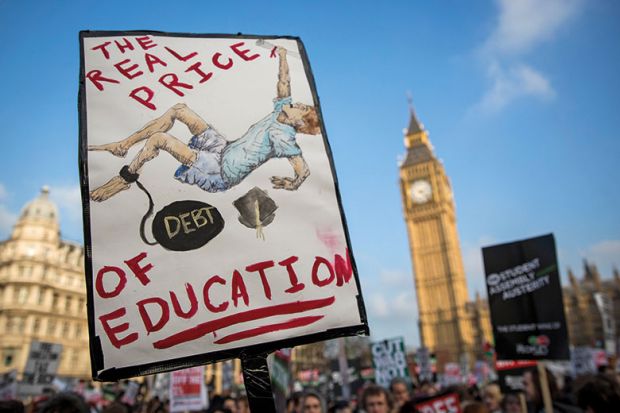Martin Lewis, the Money Saving Expert, is on a mission to change the terminology of student loans in England. In his response to the Augar review, and in various media appearances, he argues that the language is unhelpful and off-putting, and rebranding loans as a “contribution scheme” and the interest as “uprating” would better reflect the system.
He is very passionate about this proposal, so much so that he feels he can be astonishingly rude to anyone who has the temerity to challenge him. He hectored Chi Onwurah on Question Time, shouting over her in his desire to have a go at politicians he sees as scaremongering about student loans. In a recent interview with THE, he told any critics of his plan to get lost – only he used a much less polite term.
Naturally, NUS prefers to engage in debate on these issues rather than just throw expletives around. And these proposals do require debate, even if Lewis is convinced of their righteousness.
Students know that if a financial institution advances money to an individual on the understanding that they will repay that money on a regular basis, with additional amounts of money added to the outstanding balance not only to maintain its value but to generate some profit, it is a loan. To call it otherwise is just doublespeak.
It is true that student loans do have features which differentiate them from commercial debt, but this cuts two ways: yes, repayments are income-contingent and written off after 30 years, but unlike commercial debt, a graduate cannot discharge the debt through bankruptcy and, unlike commercial lenders, the terms and conditions can be changed by ministers for the worse with relative ease.
To his credit, Lewis does recognise that this latter point is one of the big issues with the system as it stands. He was stung when Vince Cable’s promise to increase the post-2012 student loan repayment threshold by average earnings was broken in 2015, having fronted the information campaign on the new system. My predecessors warned Lewis of this risk at the time, although he did not take us seriously then – we welcome his more recent advocacy for a change in the law.
However, even if that issue were addressed, students would still regard a rebranding exercise that changed little else as window dressing at best and suspicious at worst.
For a start, it is hard to find examples of countries where student loans are called anything else. Lewis has pointed to the Australian system, and it’s true that elements of this system come under the banner of the Higher Education Contribution Scheme – except that students nevertheless access the Higher Education Loan Programme to take out loans for fees (FEE-HELP) or for living costs (HECS-HELP).
The most important issue is that Lewis seems to view the problems of the system as relating solely to a lack of understanding: if only less scary language were used in relation to loans, most of the issues of access and participation would go away. Lewis may be an expert in saving money, but I’m not so sure he knows as much about HE policy.
For one thing, he articulates this issue as primarily affecting full-time, young students and their parents, when the reforms have had the greatest impact on mature and part-time students for reasons that language alone cannot address.
More generally, as the NUS has argued in its recent Poverty Commission report, the barriers to working-class students entering and succeeding in higher education are complex. We need greater investment in early-years education, a change to the culture of HE so it welcomes working-class students, greater part-time and flexible provision, reductions in accommodation costs and so much more.
In this context, there are no panaceas – but it would certainly be wrong to pretend that the present system does not involve enormous debts for students and that the negative impact of this can be elided by a change in language.
Not when the poorest graduate with the highest balances. And, as outlined by London Economics, the repayment system is flawed and regressive.
Where we agree with Martin Lewis is that there needs to be much more investment in guidance, both before and during higher education, and that some aspects – for example, the statements from the Student Loans Company sent to students and graduates – could be presented in better ways.
We also agree that more support needs to be given to students during study to help their living costs – but we absolutely do not agree that, as Lewis argues, we should simply increase student maintenance loans to achieve this.
There’s no doubt that Lewis cares about access to HE, and his proposals are well-intentioned. However, I believe that they are flawed. Lewis will need make a more cogent argument than an expletive if he is to convince me otherwise.
Amatey Doku is vice president for higher education for 2017/18 at the UK’s National Union of Students.
Register to continue
Why register?
- Registration is free and only takes a moment
- Once registered, you can read 3 articles a month
- Sign up for our newsletter
Subscribe
Or subscribe for unlimited access to:
- Unlimited access to news, views, insights & reviews
- Digital editions
- Digital access to THE’s university and college rankings analysis
Already registered or a current subscriber? Login




